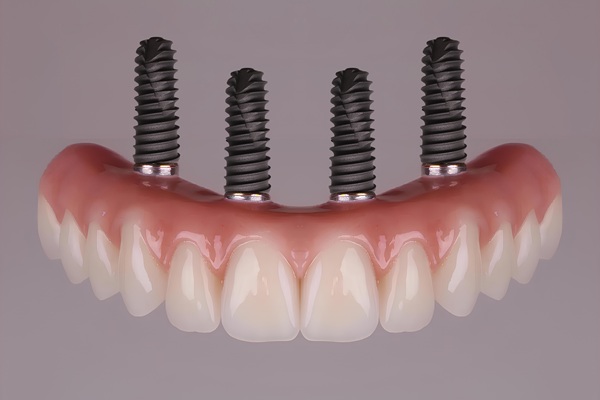Learn About an Implant Dental Restoration

An implant dental restoration is a popular choice for restoring, renewing and replacing teeth that are severely decayed or even completely missing. Implants, along with other dental restorations are known to produce great results for patients hoping to achieve a better smile and improved oral health. Ready to find out more?
Implant dental restorations
Keep reading to learn more about how the implant dental restoration process works!
What is an implant dental restoration?
A dental restoration that uses implants typically involves three parts: the fixture, abutment and prosthesis. Dental implants are used to completely restore a damaged tooth or even replace a missing tooth. Implant placement is the only type of dental restoration that preserves natural bone. When the teeth decay or fall out, the jawbone is also prone to deteriorating, which is why implants are a great choice. Because they are made of titanium, a material that is biodegradable, the body rarely rejects them once placed.
The process
The implant dental restoration process is outlined below. The first part of the dental restoration process requires the placement of the fixture, otherwise known as the actual implant. A titanium screw-shaped piece is placed directly beneath the gums and into the jawbone. Placement requires oral surgery a local anesthetic to numb the patient. Once the implant is placed, the dental restoration process has begun. The patient will then take a few months to recover. During the recovery period, the implant will begin to fuse with the jawbone naturally through a process known as osseointegration.
Once osseointegration takes place, the patient will return to their dentist to have the abutment placed. The abutment acts as the attachment piece that connects the implant to the artificial tooth. Abutments are extremely small oral appliances that are typically made of metal. They are placed right on top of the implant, around the gum lines.
Lastly, the patient will visit their dentist for the placement of the prosthesis. For most implant dental restorations, a dental crown will be used as the prosthesis. Dental crowns are great complements to single implant dental restorations because they look real and are very strong. When multiple teeth require a dental restoration, the dentist may recommend an arch of dentures.
Expectations
It is important to understand the expectations of getting an implant dental restoration. The process can be pretty lengthy, but the results are worth it. Patients should expect some soreness and slight discomfort as healing and osseointegration take place. Being aware of the time commitment and patience that is required can help patients avoid surprises or disappointments later on down the line. Ultimately, an implant dental restoration will produce positive results, allowing the patient to smile with confidence and eat comfortably.
Learn more today
Dental implant restorations can significantly improve the way patients eat, smile and even speak. Further questions or concerns regarding the restoration process should be addressed by a dentist. Reach out today to learn more or to get started.
Request an appointment here: https://www.leixdental.com or call Leix Dental at (815) 604-6104 for an appointment in our Lakewood office.
Check out what others are saying about our services on Yelp: Read our Yelp reviews.
Recent Posts
All-on-4® is an option for people who need to replace an entire upper or lower arch of their teeth. For many people, this is the solution that they have been waiting for. Because it works as a dental implant that creates an anchor for prosthetic teeth, it means that these restorations do not shift around…
When searching for a dentist near me, it is important to find someone who provides excellent care and makes every visit a positive experience. A great dentist combines skill, modern tools, and a patient-focused approach to help maintain and improve your oral health. Whether you need a routine checkup or a more complex procedure, choosing…
Periodontics is a branch of dentistry that focuses on studying, diagnosing, and treating issues that affect the gums and the bone structures that support teeth. Periodontal disease is the leading dental problem that periodontics focuses on.Periodontal disease is an infection of gum tissues caused by the bacteria in plaque and tartar getting below the gum…
Oral cancer screenings are recommended to patients who are at a higher risk of the disease. While it is not always necessary, most dentists recommend regular oral cancer screenings to ensure any concerning signs are detected as early as possible for the most effective treatment possible. Although many people have heard about oral cancer, all too…


